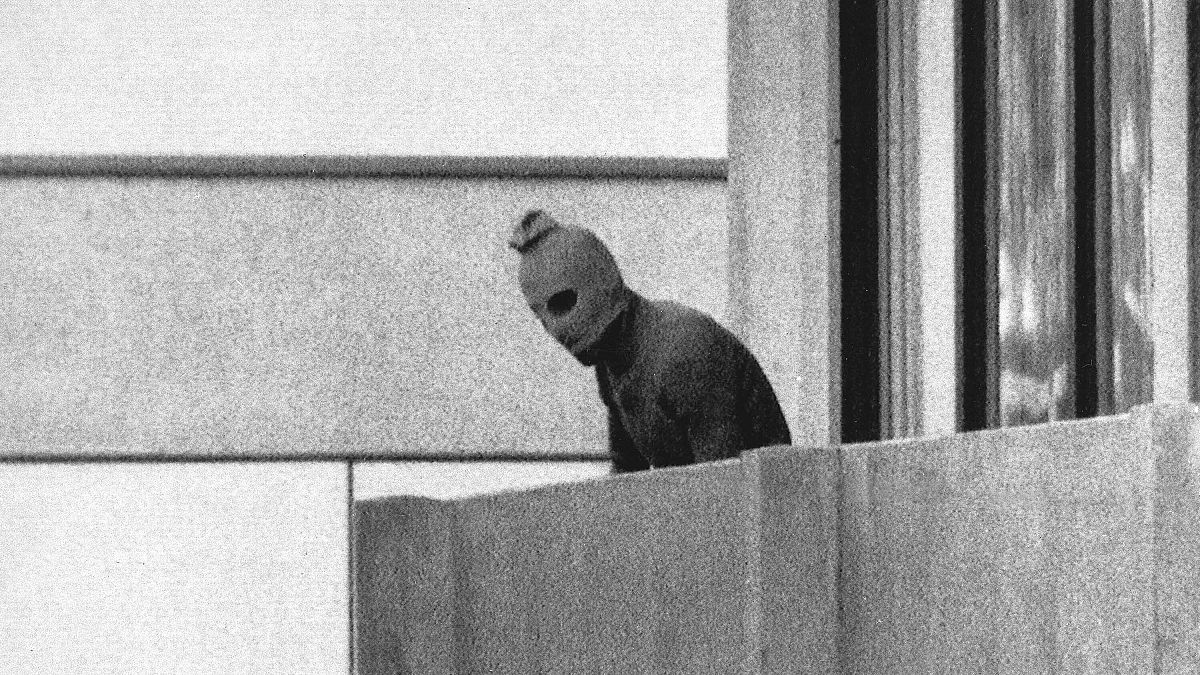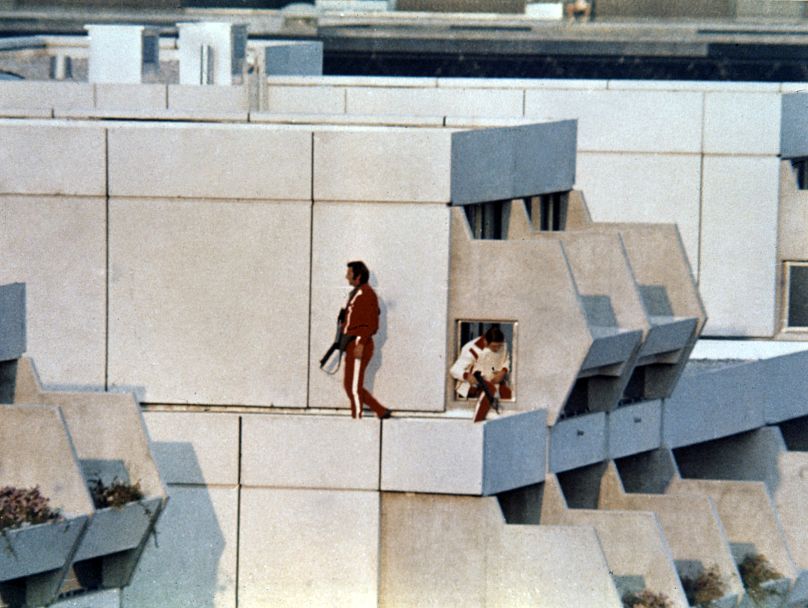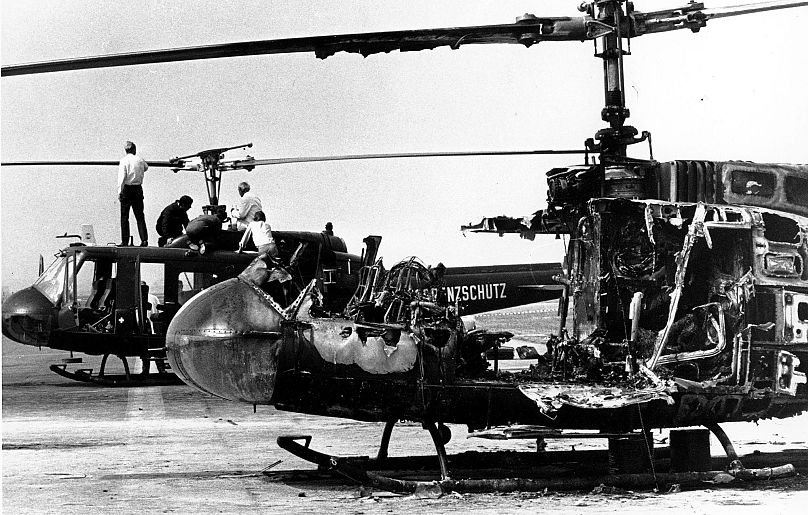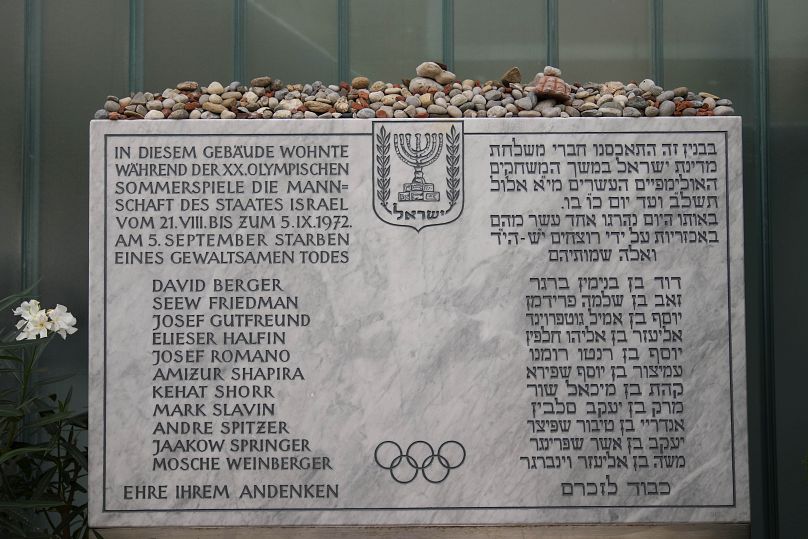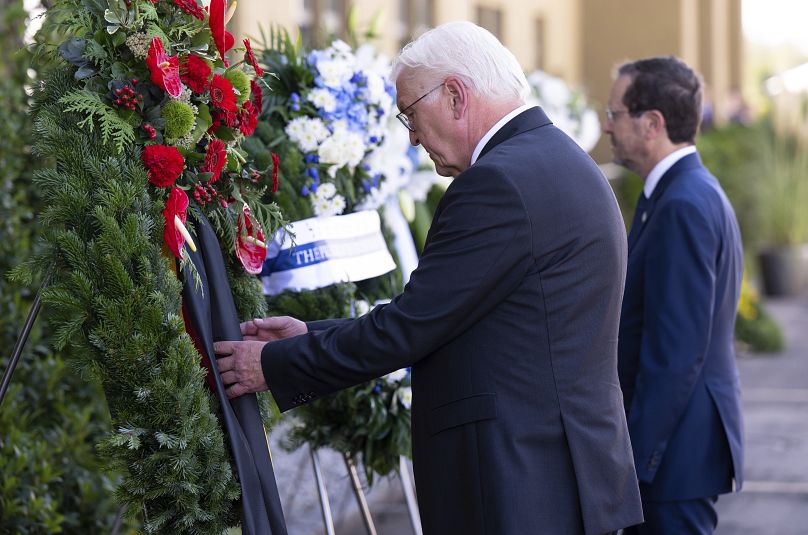Today marks 50 years since a massacre at the 1972 Olympics in Munich. Here's all you need to know about what happened.
On the night of 4 September 1972, the Israeli Olympic delegation returned to their apartment at Connollystrasse 31 in the north of Munich.
Hours later, a group of eight Palestinian militants, dressed in tracksuits and carrying weapons in bags, approached the fences of the Olympic village.
Alongside unsuspecting athletes, they climbed the fence and made their way to the two apartments housing the Israelis.
The group was later identified as the "Black September" faction of the Palestine Liberation Organisation (PLO).
The militants were initially confronted by two members of the Israeli delegation, but overpowered them and forced an injured wrestling coach Moshe Weinberg to find more hostages.
Weinburg led the masked attackers to the apartment housing Israeli wrestlers, weightlifters, and other coaches. After fighting the militants, Weinberg and weightlifter Yossef Romano were shot and killed.
The nine remaining hostages were beaten and bound in one room; wrestling referee Yossef Gutfreund, shooting coach Kehat Shorr, track and field coach Amitzur Shapira, fencing coach Andre Spitzer, weightlifting judge Yakov Springer, wrestlers Eliezer Halfin and Mark Slavin, and weightlifters David Berger and Ze'ev Friedman.
Eight other Israelis in the apartment complex hid or escaped during the initial assault and eventually fled. Athletes from Uruguay and Hong Kong -- also housed in the building, were released.
The attackers wanted to release more than 230 Palestinian prisoners who were held by Israel, as well as two left-wing extremists in West German jails.
Israel refused to negotiate. Germany offered the militants "unlimited" money or replacement hostages but both proposals were rejected.
Nearly 3,000 police officers were stationed in and around the Olympic village, while snipers surrounded the building.
As the situation drew on, German police officers were dispatched to the Olympic village to potentially launch an operation to end the hostage-taking. They retreated after the attackers threatened to kill the Israelis.
The failed rescue attempt
German authorities eventually agreed to transport the attackers and their hostages to Cairo via helicopter. The intention was to take the group to the nearby Fürstenfeldbruck NATO airbase for an armed assault to end the attack.
Unaware of the true number of assailants and ill-prepared for an assault, the authorities tried to eliminate the militants.
But after a gunfight, the Black September attackers are believed to have opened fire on their hostages and detonated grenades inside the helicopters.
All nine hostages and a West German police officer died during the botched rescue attempt. Five of the attackers also died while the other three were captured.
Witnesses and survivors continue to be haunted by the massacre, while Israel has slammed Germany.
Relatives of the athletes accuse Munich of failing to secure the Olympic Village, despite the money invested in the Games.
Germany has also been accused of ignoring warnings of a possible attack and refusing Israeli help to resolve the hostage-raking.
In official documents published in 2012 by Israel, former intelligence chief Zvi Zamir said the German police "did not make even a minimal effort to save human lives".
The decision of the International Olympic Committee (IOC) to continue the Olympics just one day after the massacre was also widely condemned.
The victims of the attack at the 1972 Olympics were finally officially remembered during Tokyo's opening ceremony last year.
An agreement that 'opens a door'
Now, 50 years after the massacre, the victims' families have reached a compensation agreement.
The German government has confirmed the families of the 11 murdered Israeli athletes will receive a total of €28 million.
Relatives of the victims had planned to boycott memorial ceremonies to mark the 50th anniversary of the attack without the deal.
The athletes' families have long accused Germany of mistakes before, during, and after the events of 5 September 1972.
With the new agreement, Germany has also acknowledged failures that authorities made during the attack and allow a review by historians.
The €28 million compensation deal includes payments already made by Berlin and is a significant increase on the initial €10 million offer to families.
According to the DPA news agency, the federal government will bear €22.5 million, the state of Bavaria €5 million and the city of Munich €500,000.
Immediately after the attack, Germany's interior ministry says it made payments to relatives of the victims amounting to 4.19 million marks (around €2 million). In 2002, the surviving relatives also received an additional €3 million.
A spokesperson for German Chancellor Olaf Scholz said he is "very glad" to have achieved the agreement.
“Germany is emphasising its responsibility for the mistakes that were made there in 1972, but also in the decades that followed,” the spokesperson added.
“The agreement cannot heal all wounds, but it opens a door to each other,” read a joint statement by German President Frank-Walter Steinmeier and his Israeli counterpart Isaac Herzog.
“With this agreement, the German state acknowledges its responsibility and recognises the terrible suffering of the murdered and their relatives."
But an end to the long-disputed compensation claim only heals some of the wounds.
'We cannot make up for what happened'
On Monday, Steinmeier apologised for multiple failures by his country at an anniversary ceremony at the Fuerstenfeldbruck airfield.
“We are talking about a great tragedy and a triple failure,” he said. “The first regards the preparation of the games and the security concept; the second the events of September 5 and 6, 1972.
"The third failure begins the day after the attack: the silence, the denial, the forgetting ... We cannot make up for what happened, or for what you experienced and suffered in the way of resistance, ignorance and injustice."
Seventy relatives of the victims were in attendance at the ceremony near Munich. Both Steinmeier and Herzog laid wreaths at the site.
Questions are still being asked by victims' relatives, who say that Germany "doesn't know what we've been through for the past 50 years".
Just weeks before the 50th anniversary of the massacre, controversy was sparked by the Palestinian President
Speaking at a news conference in Berlin alongside Scholz, Mahmoud Abbas accused Israel of committing “50 Holocausts” since 1947.
While he didn't challenge the initial remarks, Scholz later said he was "disgusted by the outrageous remarks".
Berlin has long argued the term "Holocaust" should only be used to describe the Nazis’ mass killing of 6 million Jews before and during World War II.
Berlin police confirmed they had received a formal criminal complaint for "inciting hatred" and have launched a preliminary investigation.
A German government spokesperson has since stated that Germany would welcome an apology for the 1972 massacre from the current Palestinian leadership.
Steinmeier noted on Monday that it is “very bitter that no word of sympathy, no word of regret comes from political representatives of those today."
Relatives of the victims have been waiting for half a century.
